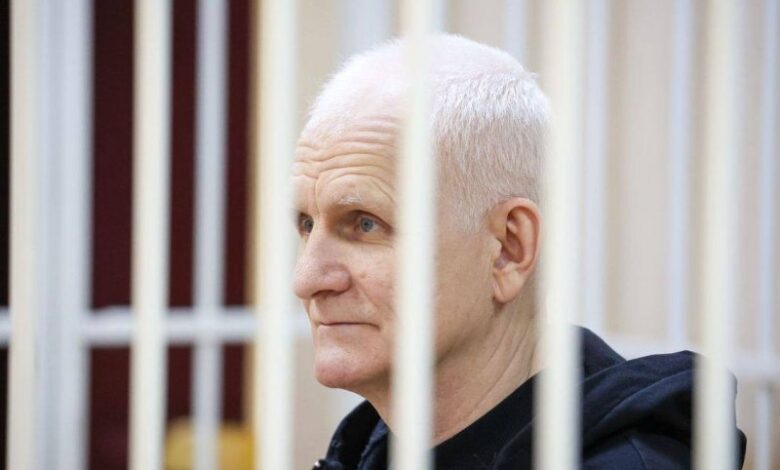Nobel laureate Ales Bialiatski sentenced to 10 years in prison

For the first time in history, a Nobel laureate was convicted after having been awarded the Nobel Prize. Belarusian human rights organizations issued a statement of protest where they called the verdict an act of political reprisal and retaliation for peaceful actions aimed at protecting human rights and freedoms in Belarus.
On March 3, the court passed a verdict in the high-profile case against the Viasna Human Rights Center. The organization’s chair Ales Bialiatski, a 2022 Nobel Peace Prize laureate, was sentenced to 10 years in a medium-security penal colony; Viasna deputy chair and vice-president of the International Federation for Human Rights (FIDH) Valiantsin Stefanovich received nine years in a medium-security penal colony; the Human Rights Defenders for Free Elections campaign coordinator and lawyer Uladzimir Labkovich was sentenced to seven years in a medium-security penal colony; and Viasna human rights activist Dzmitry Salauyou was sentenced to eight years in a penal colony (in absentia). The defendants are also to pay hefty fines.
The human rights defenders pleaded not guilty to the charges of funding the 2020 post-election protests and money smuggling. In particular, paying fines and lawyer fees for peaceful protesters was deemed an illegal activity. The court file contains 284 volumes of materials: it is a record-breaking politically motivated criminal case. Ales Bialiatski pointed out in his final statement that the defendants hadn’t been allowed to familiarize themselves with all the court case materials. During the trial, not a single request (to conduct the trial in Belarusian, remove handcuffs, provide time to study the case materials, etc.) was granted. As the verdict was pronounced, the human rights defenders stayed handcuffed with their arms twisted behind their backs.
Natallia Pinchuk, the wife of Ales Bialiatski and his representative at the Nobel Peace Prize ceremony, commented on the verdict stressing the political motive behind the criminal investigation into the human rights organization:
Whether we’re talking Ales, Valiantsin, or Uladzimir, the sentence is obviously very harsh. It’s terrible when you think about what they were tried for. Despite all those 284 volumes of the criminal file and quite a long trial, we see that the prosecutor did not and could not provide any evidentiary basis whatsoever. Obviously, it was human rights defenders who were targeted by this trial, and it was for their human rights activities that they were tried.
The fact that Ales was given 10 years instead of 12 is one of the telling moments: it seems that the sentence was commuted, but it’s not commuted at all. Again, those are very long sentences. Who are they and what were they sentenced for? For killing people, for causing some significant harm? No, none of the arguments that were made in court even had any probative value for the court to convict them under the trumped-up charges.
On the eve of sentencing, 21 international human rights organizations released a statement demanding the release of the human rights defenders and the dropping of all the charges against them. Solidarity actions are taking place abroad today in protest against the unlawful conviction and criminalization of human rights defense activities in Belarus.